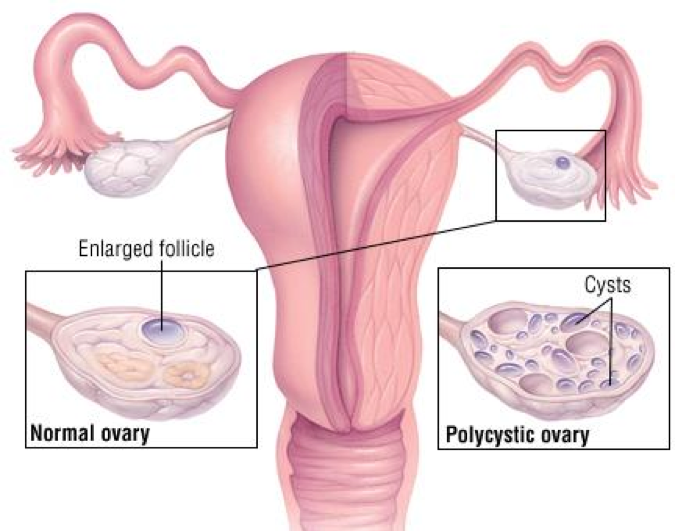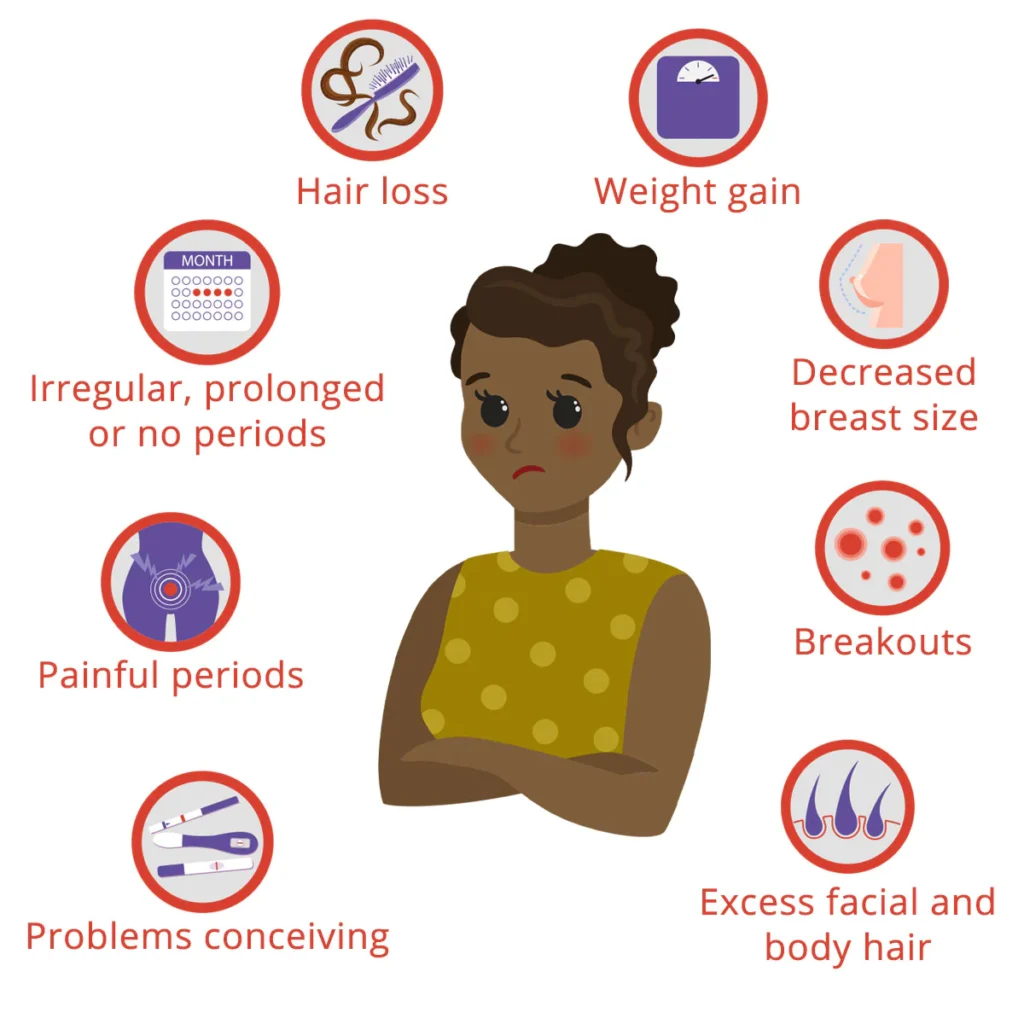Table of Contents
Toggle
What is Polycystic ovarian syndrome(PCOS) ?
Polycystic Ovary Syndrome (PCOS) and Polycystic Ovary Disease (PCOD) are becoming increasingly popular conditions to blame for weight gain. It is essential to comprehend the distinctions between PCOS and PCOD. This will help us to decide whether they are the reasons for weight gain or the not able to shed weight.
PCOD is when the ovaries do not work correctly because of imbalances in the body. PCOS is when these imbalances lead to other issues, such as acne and extra body hair. It also involves the production of higher than the normal androgen level i.e male hormone.
Unfortunately, PCOS is often only diagnosed and treated after women have been trying to conceive for a while. The terms PCOD, PCOS, and PCO are often confused. PCO is characterized by the presence of small cysts around the surface of the ovaries. It is important to know that not all women with PCO have PCOD or PCOS.
Whether you have PCOD, PCOS, PCO, thick endometrium, or high prolactin, the following information will be helpful. It’s essential to understand these conditions to manage symptoms and improve overall health.
Main problem with Polycystic ovarian syndrome (PCOS) ?
The main issue with PCOS is two-fold. Firstly, it affects fertility. Secondly, it places stress on the ovaries and disrupts the body’s hormonal levels, resulting in irregular periods.
Excess fat around the abdomen can suffocate the ovaries , make it difficulty in releasing eggs and leading to ovarian cysts . Therefore, it’s essential to pay attention to this area and maintain a healthy weight.
Neglecting ovarian health can lead to issues with fertility, hormonal imbalances, irregular menstrual cycle, excessive hair growth, and other health complications. Therefore, it’s crucial to prioritize our ovarian health and take steps to support their proper functioning.

What is the cause of Polycystic ovarian syndrome (PCOS) ?
Like many curses, PCOS has a genetic component, meaning you’re more likely to have it if it runs in your family. Many people today are affected by PCOS, even without any genetic link. This indicates that modern lifestyles have a strong link to the condition. This is both a lifestyle and social issue.
Women have made progress in traditionally manly fields such as business and management. This progress is evident when we look at how our lives have changed. These fields often require a lot of travel and long hours.
They are often left with small amounts of time and resources to eat and cook. This has caused an increase in the consumption of processed and fast food. This type of lifestyle, can contribute to insulin resistance, which is strongly linked to PCOS and bad health conditions.
Open spaces are reducing, and exercise options are limited. Traffic conditions are congested, making it hard to walk or exercise.
While genetics may play a role in the development of PCOS, lifestyle factors, can have a significant impact on its indications. It’s important to prioritize healthy eating habits and regular exercise to support our bodies and reduce the risk of PCOS.
In my opinion, there are certain ‘events’ that can increase one’s chances to have PCOS. These include:
-
- The 10th/12th grade exams where you spend long hours sitting to study. You end up eating junk food like chips, sweets, etc. at night and drinking caffeinated drinks to stay awake. It’s common for girls to gain weight during this phase.
-
- Hostel food or being in college means spending all your pocket money on fast food and coffee shops. Exercise is often neglected.
-
- Moving away from home to work means not having a functional kitchen, relying on office canteens and instant pizza.
-
- The main challenge is clear: Eating nutritious food, exercising regularly and being thin appear to be an unreachable dream. We are living in a situation that makes this difficult.
-
- This leads to crash diets that deprive our bodies of essential nutrients. This leaves us with a fear of food in our minds. It makes our body struggle even more as they are already overworked.
-
- Eating disorders such as bulimia can lead to irregular menstrual cycle. These include amenorrhea , which can increase the risk of developing PCOS.
-
- It is essential to prioritize our health. We should nourish our bodies with wholesome food, instead of crash diets. Crash diets deprive our bodies of essential nutrients.
-
- Having healthy ovaries is not just important for fertility, but also for our overall well-being. Regular ovulation is essential for hormonal balance and maintaining a healthy weight.
-
- Women who experience irregular ovulation may struggle with body image issues and may not feel comfortable in their own skin. Let’s focus on supporting our ovaries and taking care of our health, rather than obsessing over size or shape.

What pcod can cause to a women ?
It can cause Type 2 diabetes that can lead to increased blood sugar level. It also have various long-term effects her health. These include high blood pressure, which can lead to heart diseases, and high body fat. Additionally, depression, increased insulin levels, irregular menstrual periods that leads difficulty in conceiving are also possible complications.
It is crucial to seek help for Type 2 diabetes and related health concerns before experiencing difficulty in conceiving. However, it’s important to remember that getting pregnant is not the only measure of a woman’s worth.
Women should strive to have regular and painless periods. The societal taboo surrounding irregular menstrual cycle must be overcome.
Fortunately, in India, there are advanced medical technologies and skilled doctors who can help individuals struggling with getting pregnant. With proper medical care and support, getting pregnant can be possible.
It’s essential to prioritize one’s health and well-being, rather than the number of children one has. Despite the rising incidence of conditions like polycystic ovary syndrome (PCOS), the population continues to grow. Women can even give birth to twins and triplets with the help of modern medical interventions.

Symptoms of PCOD (polycystic ovarian disease)
· Gained a lot of weight , specifically around the whole belly, not able to lose weight.
· In some cases weight loss.
· Hair loss or thinning hair.
· Irregular periods or very light period, missed periods.
· Oily skin , Acne.
· Hair growth on the face and body.
· Women with PCOS have insulin resistance.
· Not getting pregnant or trouble getting pregnant.
· Dark velvety patches of skin around chin, lips and armpits.
· If left untreated and ignored then it may lead to endometrial cancer.
Diagnosis of PCOS
· Ultrasound.
· Blood test.
Effortless and regular periods are a natural consequence of optimum body fat, health, and fitness levels. When all hormones, enzymes, and organs like ovaries, kidneys, liver are in good health. Women should feel comfortable before and during periods.
Any discomfort, irritation, or cramping during, before, or after periods is abnormal and indicates poor health and fitness levels. It’s imperative to improve one’s health and fitness level to experience a pain-free, regular period without resorting to medication.
At menarche (first period) or menopause, periods may naturally become irregular, scanty, or heavy. One must learn to difference between a regular period and natural or unnatural irregular period. An irregular period may be a symptom of PCOS and can cause discomfort.
Lifestyle changes is the buzzword to improve one’s health and fitness level, and information is the key to make lifestyle changes.
To begin with, it’s essential to lower body fat levels to support healthy ovarian function. It’s crucial not to hide behind the excuse of PCOS/PCOD and start making changes. Healthy ovarian function can be achieved by improving insulin sensitivity and by lowering body fat levels. However, it’s easier said than done and requires significant effort from one’s side.
Remember, it’s not enough to know the methods; it’s essential to implement them. The below methods can help:
· Incorporate physical activity into your routine to increase insulin sensitivity, lower body fat levels, and support healthy ovarian function.
· Follow a healthy diet that includes a balance of macronutrients like proteins, carbohydrates, and fats.
· Avoid processed and refined foods. Increase the intake of fiber-rich whole foods to improve insulin sensitivity and lower body fat levels.
· Reduce stress levels by practicing relaxation techniques like meditation, yoga, or deep breathing exercises.
· Get enough sleep and maintain good sleep hygiene to support healthy ovarian function.
· In follicular phase women should eat flex seeds and pumpkin seeds.
· In luteal phase women should take sesame seeds and sunflower seeds.
· Yoga asanas like yoga mudra asana, kurma asana, pashuvishram asana, ardhmatsyender asana, pranayama and kapalbhati are must for PCOS.
Implementing these methods may require significant effort. However, the benefits are great. Improved health and fitness can lead to a pain-free, regular period without relying on medication.

4 Main strategies for curing PCOS permanently
· Nutrition strategies.
· Exercise strategies.
· Sleep strategies.
· Relationships strategies.
Key Points
· PCOS is a prevalent hormonal disorder that affects women of reproductive age.
· It can be identified by lack of ovulation, high levels androgens, and the presence of numerous small cysts on the ovaries.
· PCOS can lead to missed or irregular menstrual cycles, excessive hair growth, acne, and weight gain.
· Women with PCOS are also at an increased risk of type 2 diabetes, high blood pressure, heart problems, and endometrial cancer.
· The type of treatment for PCOS may vary based on whether a woman is planning to conceive or not. Those who intend to have a baby in the future may require different medications than those who do not.
PCOD is when the ovaries do not work correctly because of imbalances in the body. PCOS is when these imbalances lead to other issues, such as acne and extra body hair.
The main challenge is clear: Eating nutritious food, exercising regularly and being thin appear to be an unreachable dream. We are living in a situation that makes this difficult.
The main challenge is clear: Eating nutritious food, exercising regularly and being thin appear to be an unreachable dream. We are living in a situation that makes this difficult.
For information about health visit us

1 thought on “Polycystic ovarian syndrome / disease, Symptoms of PCOD”